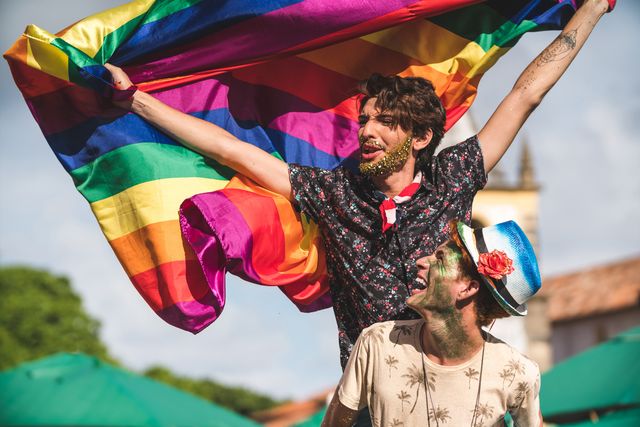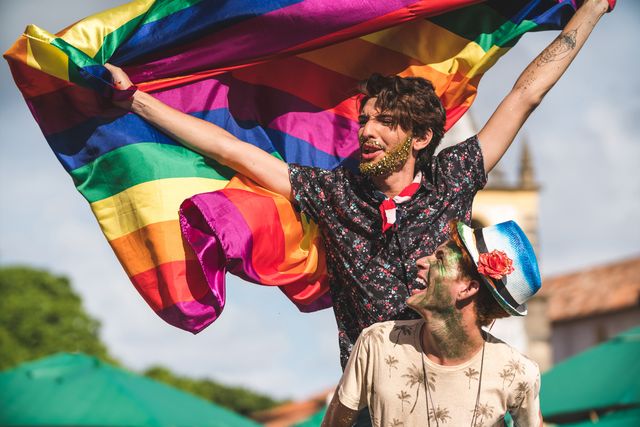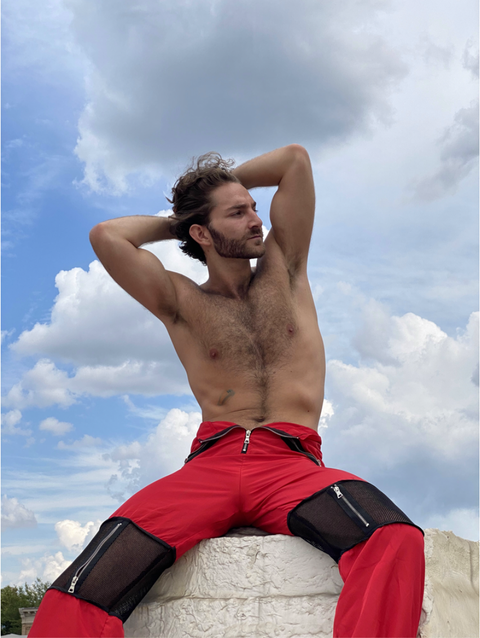

Pollyana VenturaGetty Images
I remembering Googling “bisexual man” my freshman year of college. The top articles I found were research papers about bi and “down low” men spreading HIV. My first association with male bisexuality was that all bi men were HIV-positive, and we carelessly spread the life-altering virus. According to Google—or the world—that’s all bi men were. That is, if we even existed, which was, and somehow still is, up for debate.
It perplexes me how many people don’t believe male bisexuality exists, given that I’m right here. Often, these naysayers view bi men as being “secretly gay,” in large part because a number of gay men briefly call themselves bi as a pitstop of their way to Gay Town. But for many men, like myself, bisexuality is our final destination.
And it frustrates me that many of the folks who do realize bisexuality exists believe harmful stereotypes about bi folks, like we’re confused, greedy, slutty, incapable of being monogamous, more likely to cheat, and more likely to spread STIs.
No wonder it took years of self-loathing, denial, and having blackout sex with men to finally embrace my bisexuality.
Things have changed since I began college in the late 2000s. I just Googled “bisexual man” and the first article that comes up is from The Advocate, titled: “15 Bisexual Men Who Prove That Bisexuality Isn’t a Phase.” Then there are a lot of news hits about the recent study that “proved” male bisexuality exists by studying men’s arousal patterns while viewing erotic stimuli. I have to admit, it’s a little disheartening that in 2020, we still feel compelled to prove our existence. Nevertheless, I’m grateful this study did so. (FYI: The first “bi men spreading HIV” study now comes up at the end of the second Google page.)
It’s huge that we’ve seen an explosion of bisexual content in the past decade. This is a necessary step forward for bi visibility. I know visibility is a buzzword in this day and age, and it’s a shame that it is, because it’s indispensable. For bisexuals, it helps us realize that we’re not alone or confused. We’re real. Visibility is also the first step in creating (or finding) bi communities. The more visibility there is, the more people feel comfortable coming out, which encourages others to come out too. The more people are out, the more people can connect to create bi communities and spaces.
But as you can tell by the top articles on Google, the majority of bisexual content is written by bi people for straight people. It’s a lot of “5 Things Never to Say to Bisexuals” and “10 Stereotypes about Bisexuals That Aren’t True.” Or, it’s content where bi people attempt to “prove” our existence, which frankly, is infuriating. (I know I keep harping on this, but I genuinely don’t understand how people can be like, “You can like men. You can like women. But liking men and women? Impossible!”)
There are far fewer articles written by bi people for other bi people. There are fewer stories addressing internalized biphobia or what it’s like being a bi person who actually does embody a lot of the (negative) stereotypes about being bi.
Bi people face unique struggles. Outside of the stereotypes that come with being bi, there’s also a lot of emotional pain that comes from not feeling welcomed in gay or straight spaces. Often, this is referred to as double discrimination, and it’s by far, the worst part of being bi. You feel isolated and like you can’t talk to anyone about your struggles because they won’t understand. Or they’ll say something insensitive. (Just date women if you’re bisexual!) Or they’ll somehow diminish your identity. This is why bisexual people have higher rates of depression, anxiety, suicidal thoughts, drug abuse, and physical pain than gay people (which is already much higher than straight people).
I don’t want to make it seem like all doom and gloom, though. I’ve found incredible straight and gay friends who embrace my bisexuality. I no longer have gay friends who say “ew” when I say I had sex with (or have a crush on) on a woman. (Side note: Gay men who call vaginas disgusting or say it’s “gross” to have sex with women are misogynistic pieces of trash. It’s not a cute look.)
I’ve also found an incredible bi community within the sex-positive, polyamorous, kink scene, specifically through the sex club New Society For Wellness (NSFW). The sex, ironically, isn’t what it’s about for me. It’s a space where I feel affirmed for being bi as I’m surrounded by other bi men, women, and nonbinary folks. While I love my gay and straight friends, it’s simply not the same as being part of a bi community.
I’ve spent the majority of my adult life as the “bi guy.” As a public figure, I’ve done everything in my power to promote bi visibility, share bi stories, and address the specific needs of bi people. I had no intention of becoming this person. I was simply trying to figure out my own bi identity, but after my first article I wrote about bisexual dating went viral—and I received dozens of emails praising me for sharing the underrepresented bisexual male voice—I kept writing about bisexuality. I kept writing because I knew how lonely it can be feeling like there’s no one else like you.
This week (September 16-23) is Bisexuality Awareness Week (#Biweek). In honor of #Biweek, Men’s Health will share stories about bisexuality—our hope being that when a bisexual or questioning man Googles “Male Bisexuality” or “Bisexual Man,” they can learn that they are valid, and there’s a growing bi community out there just waiting for them.
This content is created and maintained by a third party, and imported onto this page to help users provide their email addresses. You may be able to find more information about this and similar content at piano.io

